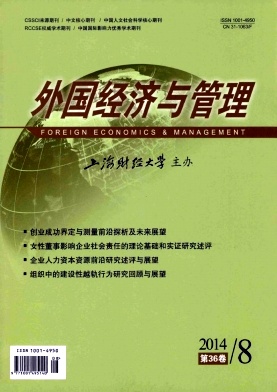组织中的建设性越轨行为研究回顾与展望
外国经济与管理 2014 年 第 36 卷第 08 期, 页码:45 - 52
摘要
参考文献
摘要
越来越多的研究表明,组织中的员工越轨行为并非都是有害的。员工可能会在亲社会动机的驱动下,主动地违反组织规则或规范,即表现出建设性越轨行为。然而,建设性越轨行为的定义、测量、影响因素和影响结果等问题,目前还没有得到系统而一致的回答。本文基于文献回顾,从内涵、与相关概念的关系及测量等方面剖析了建设性越轨行为的概念,从个体层面、团队层面和组织层面总结了建设性越轨行为的影响因素,分析了建设性越轨行为的主要结果变量,并指出了未来的研究方向。
[1]Baer M.Putting creativity to work:The implementation of creative ideas in organizations[J].Academy of Management Journal,2012,55(5):1102-1119.
[2]Bhal K T and Dadhich A.Impact of ethical leadership and leader-member exchange on whistle blowing:The moderating impact of the moral intensity of the issue[J].Journal of Business Ethics,2011,103(3):485-496.
[3]Bryant P C,et al.When rule makers become rule breakers:Employee level outcomes of managerial pro-social rule breaking[J].Employee Responsibilities and Rights Journal,2010,22(2):101-112.
[4]Crant J M,et al.Dispositional antecedents of demonstration and usefulness of voice behavior[J].Journal of Business and Psychology,2011,26(3):285-297.
[5]Dahling J J,et al.Breaking rules for the right reason?An investigation of prosocial rule breaking[J].Journal of Organizational Behavior,2012,33(1):21-42.
[6]Galperin B L and Burke R J.Uncovering the relationship between workaholism and workplace destructive and constructive deviance:An exploratory study[J].International Journal of Human Resource Management,2006,17(2):331-347.
[7]Galperin B L.Determinants of deviance in the workplace:An empirical examination of Canada and Mexico[D].Unpublished doctoral dissertation,Concordia University,Montreal,Canada,2002.
[8]Hung Hao-Kai,et al.Voice behavior and performance ratings:The role of political skill[J].International Journal of Hospitality Management,2012,31(2):442-450.
[9]Liao H,et al.Looking at both sides of the social exchange coin:A social cognitive perspective on the joint effects of relationship quality and differentiation on creativity[J].Academy of Management Journal,2010,53(5):1090-1109.
[10]Madjar N,et al.Factors for radical creativity,incremental creativity,and routine,noncreative performance[J].Journal of Applied Psychology,2011,96(4):730-743.
[11]Mainemelis C.Stealing fire:Creative deviance in the evolution of new ideas[J].Academy of Management Review,2010,35(4):558-578.
[12]Morrison E W.Doing the job well:An investigation of prosocial rule breaking[J].Journal of Management,2006,32(1):5-28.
[13]Mueller J S and Kamdar D.Why seeking help from teammates is a blessing and a curse:A theory of help seeking and individual creativity in team contexts[J].Journal of Applied Psychology,2011,96(2):263-276.
[14]Parks J M,et al.Elasticity in the“rules”of the game:Exploring organizational expedience[J].Human Relations,2010,63(5):701-730.
[15]Shin S J and Zhou J.Transactional leadership,conservation,and creativity:Evidence from Korea[J].Academy of Management Journal,2003,46(6):703-714.
[16]Spreitzer G M and Sonenshein S.Positive deviance and extraordinary organizing[A].Cameron K,Dutton J and Quinn R(Eds.).Positive organizational scholarship[C].San Francisco:Berrett-Koehler,2003:207-224.
[17]Spreitzer G M and Sonenshein S.Toward the construct definition of positive deviance[J].American Behavioral Scientist,2004,47(6):828-847.
[18]Tierney P and Farmer S M.Creative self-efficacy development and creative performance over time[J].Journal of Applied Psychology,2011,96(2):277-293.
[19]Umphress E E and Bingham J B.When employees do bad things for good reasons:Examining unethical pro-organizational behaviors[J].Organization Science,2011,22(3):621-640.
[20]Vadera A K,et al.Constructive deviance in organizations:Integrating and moving forward[J].Journal of Management,2013,39(5):1221-1276.
[21]Warren D E.Constructive and destructive deviance in organizations[J].Academy of Management Review,2003,28(4):622-632.
[22]Whiting S W,et al.Effects of task performance,helping,voice,and organizational loyalty on performance appraisal ratings[J].Journal of Applied Psychology,2008,93(1):125-139.
[23]Whittington J L,et al.Transformational leadership,goal difficulty,and job design:Independent and interactive effects on employee outcomes[J].Leadership Quarterly,2004,15(5):593-606.
[24]段锦云.家长式领导对员工建言行为的影响:心理安全感的中介机制[J].管理评论,2012,24(10):109-116.
[25]梁建和唐京.员工合理化建议的多层次分析:来自本土连锁超市的证据[J].南开管理评论,2009,12(3):125-134.
[26]谭亚莉等.工作场所员工非伦理行为研究述评与展望[J].外国经济与管理,2013,34(3):40-48.
[27]王国锋等.以台湾服务业为视角的自我牺牲型领导与下属亲社会行为研究[J].管理学报,2013,10(9):1309-1315.
[28]吴隆增等.变革型领导行为对员工建言行为的影响研究[J].管理学报,2011,8(1):61-80.
[29]周建涛,廖建桥.为何中国员工偏好沉默[J].商业经济与管理,2012,253(11):71-78.
[2]Bhal K T and Dadhich A.Impact of ethical leadership and leader-member exchange on whistle blowing:The moderating impact of the moral intensity of the issue[J].Journal of Business Ethics,2011,103(3):485-496.
[3]Bryant P C,et al.When rule makers become rule breakers:Employee level outcomes of managerial pro-social rule breaking[J].Employee Responsibilities and Rights Journal,2010,22(2):101-112.
[4]Crant J M,et al.Dispositional antecedents of demonstration and usefulness of voice behavior[J].Journal of Business and Psychology,2011,26(3):285-297.
[5]Dahling J J,et al.Breaking rules for the right reason?An investigation of prosocial rule breaking[J].Journal of Organizational Behavior,2012,33(1):21-42.
[6]Galperin B L and Burke R J.Uncovering the relationship between workaholism and workplace destructive and constructive deviance:An exploratory study[J].International Journal of Human Resource Management,2006,17(2):331-347.
[7]Galperin B L.Determinants of deviance in the workplace:An empirical examination of Canada and Mexico[D].Unpublished doctoral dissertation,Concordia University,Montreal,Canada,2002.
[8]Hung Hao-Kai,et al.Voice behavior and performance ratings:The role of political skill[J].International Journal of Hospitality Management,2012,31(2):442-450.
[9]Liao H,et al.Looking at both sides of the social exchange coin:A social cognitive perspective on the joint effects of relationship quality and differentiation on creativity[J].Academy of Management Journal,2010,53(5):1090-1109.
[10]Madjar N,et al.Factors for radical creativity,incremental creativity,and routine,noncreative performance[J].Journal of Applied Psychology,2011,96(4):730-743.
[11]Mainemelis C.Stealing fire:Creative deviance in the evolution of new ideas[J].Academy of Management Review,2010,35(4):558-578.
[12]Morrison E W.Doing the job well:An investigation of prosocial rule breaking[J].Journal of Management,2006,32(1):5-28.
[13]Mueller J S and Kamdar D.Why seeking help from teammates is a blessing and a curse:A theory of help seeking and individual creativity in team contexts[J].Journal of Applied Psychology,2011,96(2):263-276.
[14]Parks J M,et al.Elasticity in the“rules”of the game:Exploring organizational expedience[J].Human Relations,2010,63(5):701-730.
[15]Shin S J and Zhou J.Transactional leadership,conservation,and creativity:Evidence from Korea[J].Academy of Management Journal,2003,46(6):703-714.
[16]Spreitzer G M and Sonenshein S.Positive deviance and extraordinary organizing[A].Cameron K,Dutton J and Quinn R(Eds.).Positive organizational scholarship[C].San Francisco:Berrett-Koehler,2003:207-224.
[17]Spreitzer G M and Sonenshein S.Toward the construct definition of positive deviance[J].American Behavioral Scientist,2004,47(6):828-847.
[18]Tierney P and Farmer S M.Creative self-efficacy development and creative performance over time[J].Journal of Applied Psychology,2011,96(2):277-293.
[19]Umphress E E and Bingham J B.When employees do bad things for good reasons:Examining unethical pro-organizational behaviors[J].Organization Science,2011,22(3):621-640.
[20]Vadera A K,et al.Constructive deviance in organizations:Integrating and moving forward[J].Journal of Management,2013,39(5):1221-1276.
[21]Warren D E.Constructive and destructive deviance in organizations[J].Academy of Management Review,2003,28(4):622-632.
[22]Whiting S W,et al.Effects of task performance,helping,voice,and organizational loyalty on performance appraisal ratings[J].Journal of Applied Psychology,2008,93(1):125-139.
[23]Whittington J L,et al.Transformational leadership,goal difficulty,and job design:Independent and interactive effects on employee outcomes[J].Leadership Quarterly,2004,15(5):593-606.
[24]段锦云.家长式领导对员工建言行为的影响:心理安全感的中介机制[J].管理评论,2012,24(10):109-116.
[25]梁建和唐京.员工合理化建议的多层次分析:来自本土连锁超市的证据[J].南开管理评论,2009,12(3):125-134.
[26]谭亚莉等.工作场所员工非伦理行为研究述评与展望[J].外国经济与管理,2013,34(3):40-48.
[27]王国锋等.以台湾服务业为视角的自我牺牲型领导与下属亲社会行为研究[J].管理学报,2013,10(9):1309-1315.
[28]吴隆增等.变革型领导行为对员工建言行为的影响研究[J].管理学报,2011,8(1):61-80.
[29]周建涛,廖建桥.为何中国员工偏好沉默[J].商业经济与管理,2012,253(11):71-78.
引用本文
李红, 刘洪. 组织中的建设性越轨行为研究回顾与展望[J]. 外国经济与管理, 2014, 36(8): 45–52.
导出参考文献,格式为:





 8825
8825  830
830

